#Marengo's Opinion
Note
Love your posts! why do you think Jikook are the real deal and not say, vmin or yoomin etc?
Dear Anon …
I will admit that I decided to reply to your ASK because I thought I was gonna be short and quick with it 🤡.
BUT, GOSH DARN IT, IT WASN’T AS SHORT, NOR AS QUICK, AS I THOUGHT BRO!
So I apologise for all the Anons I’ve been respectfully “neglecting” for the time being 🙏🏾. Thing is, some of y’all send me ASKS which would really take me daaaaaays to reply, cause I’m big on receipts, so I MUST do my thorough research on EVERYTHING. Hence, as you’ll see below, I obviously underestimated this ASK I was actually thinking it would take me a quick afternoon, but it took me muuuuuch longer, between IRL schedules and me continuously reminiscing adorable jikook details 🥹🥹🥹 but, by the time I realised what I got myself into, I had already started it … AND … it kinda came as such a cute subconscient surprise, during a rather shitty week, that I couldn't stop.
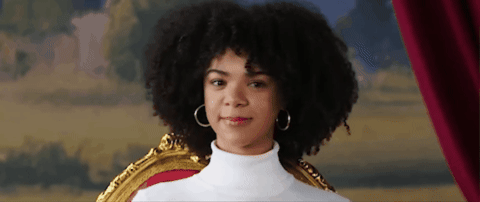
So … Why do I think Jikook Is the real deal? Mmmhmmm, let first start with a little correction to that question:
Why do I think Jikook could be the real deal? Let’s please never forget that they are not confirmed 🙏🏾
If you’ve been around long enough to watch a good amount of the boys original content, you might be probably familiar with the fact that the boys are all very affectionate with each other, in fact, they’ve all had “moments” and by moment I mean situations that are commonly shippable with each other, and if you’ve been around enough shipper spaces you would have read/heard that “x-member only does this with x-member”. Now, even though there are a few known things that JK & JM have done just for each other, that isn’t what I mainly base my speculations on.
What really makes me raise my eyebrow, JK-style, are the amount of times they’ve braved to test some boundaries, as well as the times they’ve allowed their impulses to momentarily take over, and, last but not least, the amount of concessions, understanding, and wake-up-calls that their members provide them with. All in all ⚠️IN MY OPINION LIKE EVERYTHING IN THIS POST⚠️ JK & JM have come really far, faltered quite a bit, dared a lot and have also matured as couple, just the right amount, given their circumstances.
“Uuuuh, so … What do you mean by alla dat?”
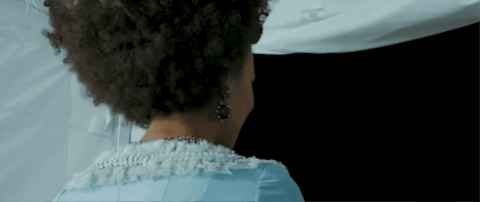
Well, for example ...
It’s the way they publicly “argue”
The only time we’ve had a public display of an argument in bangtan was Jin and Tae for that stage disagreement, which they all sat down and discussed. Other than that, we know that the members have had many private arguments, some which they discussed as a group (HopeKook banana-fight … kinda … JK really didn’t give the members a chance, he told them and hobi reacted LOL) and some which they solved solely with the parties involved (VMIN dumpling incident). YET, JK & JM seem to have the need to solve many of their could-easily-become-an-argument-for-no-reason arguments in a very let’s-do-this-right-here-right-now way, and perhaps because they are aware that they are very passionate during their discussions, they do make a conscious effort to at least sound playful at the beginning 🤡…
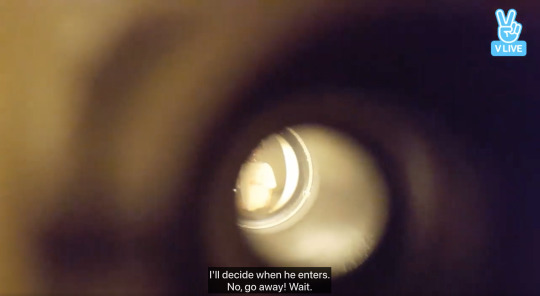
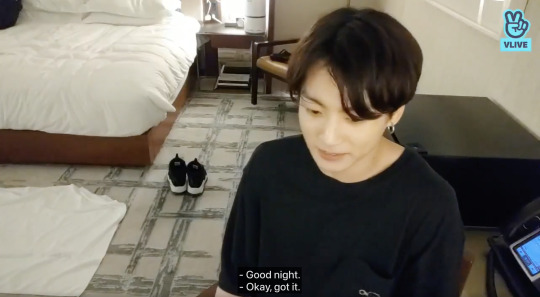


In addition, if JM is the one to start the whole thing, JK will try his best and so far he’s never failed to keep calm while at the same time try to divert the attention to something else, but in this type of situations JM is a bull and JK is, metaphorically, the only one drenched in red, so eventually, the members do chime in, trying to help JK, because I can imagine that facing a whole JM, int that state, can be something 😬 JM takes petty, and give-me-what-I’m-asking for-right-now, to a whole new level. If it is JK to start it, he knows he will get an apology, at some point, but he also knows that it is the most he will get at least publicly, because once again, facing a whole JM can be something.
Afterall, Let’s not forget they both chose B, during the scenario in the image below, so in a way, their little bickering is just not avoidable … 🤡
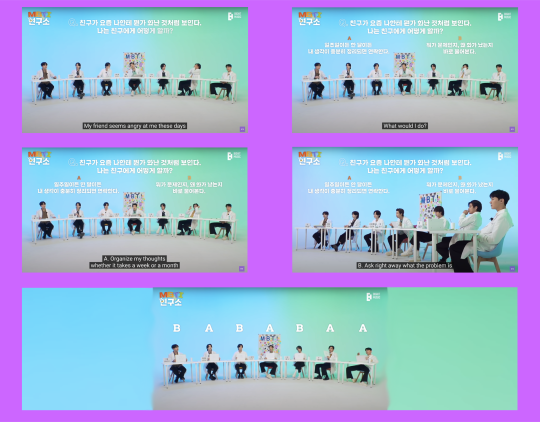
It’s the way that for example, in the recent years, the 94s have been “taunting” them and the way VHope know more than they let on, and 2Seok play along ... basically Hobi is everywhere 🤡
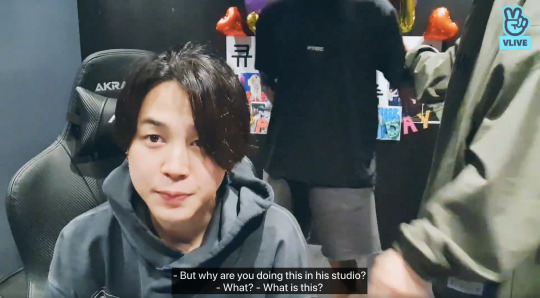
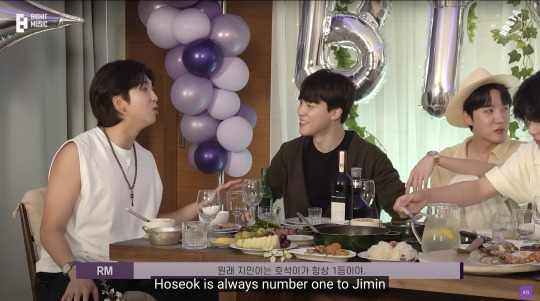
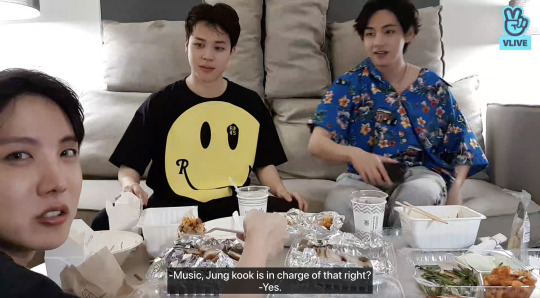

By now we should be very familiar with the support that the Tannies in general have for the LGBTQIA+ community, and between 2022 and last year, the 94s were very on point with reminding us about that. From collaborating with Balming Tiger to posting the lesbian scene in Wheel of Fortune and Fantasy during pride month (Joonie) or from being a close friend to Jo Kwon to having his Listening Party’s afterparty at a gay bar (Hobi), the 94s have been present (The Gay Bar → Trunk Seoul).
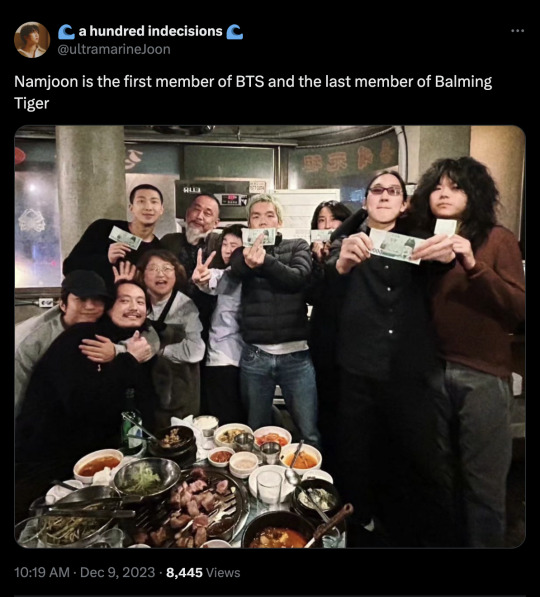

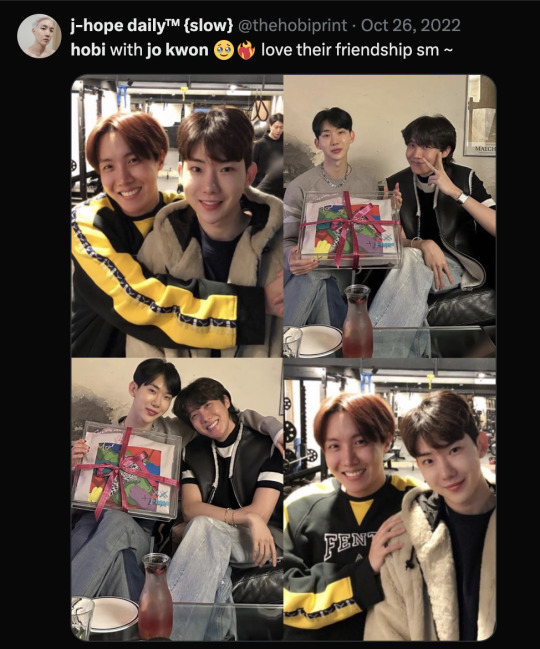
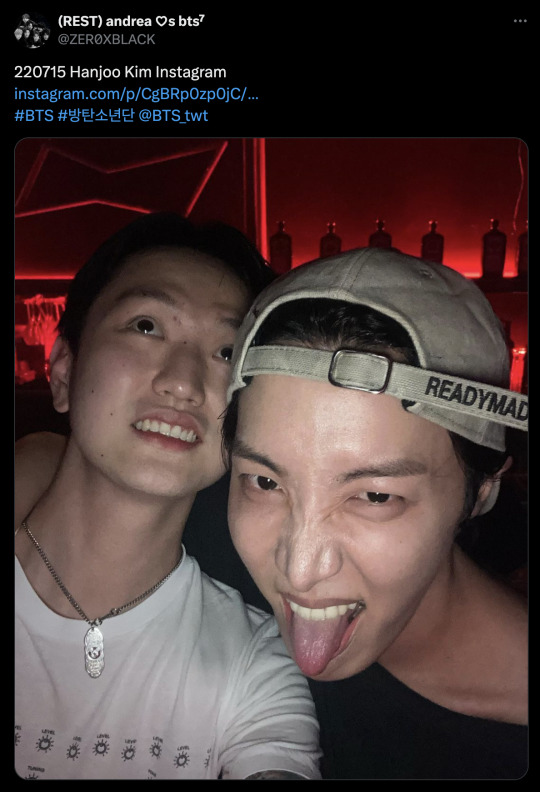
The Tannies have inside jokes to no end. If you ask me, this is one of the few ways they have in order to keep a couple of things just for themselves. For example, a reference from a movie/drama they won’t specify but ARMY will find anyways, because we on top of business like that 😎 … so time too much so 🤡, laughing about a picture on a phone they won’t show us and perhaps… the playful taunting of a couple they can’t out?
But why do that? Won’t it out them?! … It hasn’t thus far has it? Because I do believe it is part of the things which, for now, they are keeping just for them, for obvious reasons but also because I think that in a way the 94s are trying to create normality in their environment, and the universe only knows how important it is to know that your close ones perceive you as you always were, regardless of coming out etc, particularly in a society that tries so fucking hard to make you think otherwise.
It’s the way we keep spotting random oh-I-didn’t-know details and the way in which we are made privy of non-requested good-for-you-bro! type of TMI
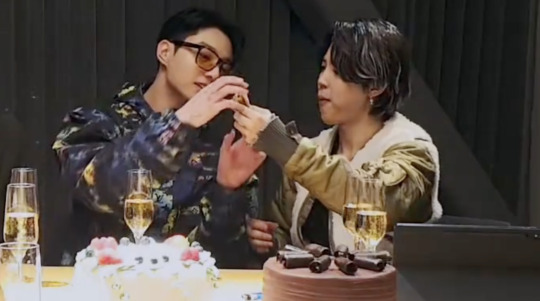

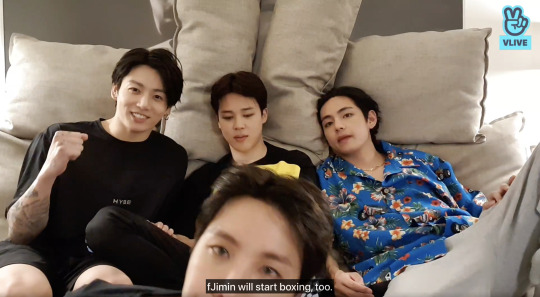

In the 1st screenshot (ss) JK wanted more pizza, but the boys finished literally within minutes I kinda wanna say second really, they inhaled it but this are the same people who gave away their album for some meat 🤡 and JM just let him have a bite of his, like it was it was expected of him to do so. During this same live, JM pointed out to JK that the champagne they were drinking is the only one he can drink or that he likes; and JK took note of that. How do I know?
In the 4th ss JK got champagne for everyone to cheer with, but didn’t prepare anything for JM. Eventually, Hobi would ask JM if he wanted a glass and Tae would try to make him drink from his glass, but JM would refuse on both occasions. This is the same live where we find out that JK’s mom prepared seaweed soup traditional soup made on a family member’s birthday in South Korea because it was JM’s birthday. So many details, so freaking useless to me as I will never be with either JK or JM in that capacity; but good to know I guess.
Also, JM is going to be your boxing partner? JK comes to your room very often? GOOD FOR YOU BROS. Like … When’s my turn?! That’s what I really want to know … 😑… 😩
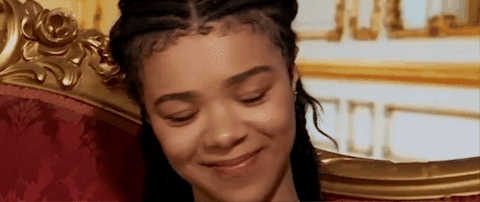
… and so on and so forth.
I could go on further, but I really don’t have that type of time as of recently, but I hope you can see that what I am trying to say is that the proof is in the pudding, so to say. There isn’t a one ultimate defining moment, if there were, I would guess that only JM and JK would know what did it for them, what made JK think “Ah, yes, he is the one …” which i am 85.13% sure it is going to be a different moment in time for JM, in the same way they get irritated with each other for different reason eccetera eccetera eccetera.
Anyways Anon, hope I was able to answer your questions somewhat and that I wasn’t just confusing. Thank you for stopping by and have a safe and serene day!
Always respectfully yours 💜🫰🏾,
Marengo.
11 notes
·
View notes
Text
Hortense about "Les Pestiférés de Jaffa"
This is an add-on to this post, in particular to the wonderful answer by @orsuliya about Gros being angry at Bessières and depicting him in this embarrassing way as a way of revenge. I wanted to reblog at first but this translation did get kind of long, so I thought I'd better put it in its own post. Here is what Hortense has to say in her memoirs about that very same painting, and in particular about her brother’s reaction to it. - However, I believe Hortense places this scene somewhat earlier, during the Consulate, even early in the Consulate, a rather short time after the battle of Marengo and after Gros had returned from Italy to Paris (which happened somewhen in 1801?).
As I had often heard [Napoleon] and those who had accompanied him talk about his visit to the plague-stricken people of Jaffa, I thought there would be a fine picture to paint on this subject. Gros, who had just arrived from Italy, was in the Tuileries one morning. I told him about my idea. He approved it and painted a picture that has remained one of his masterpieces. It was exhibited at the Salon.
At which point editor Hanoteau adds a footnote about the painting:
Gros, who had just completed a mission to Italy to select the works of art granted to us by the peace treaty, exhibited the Pestiférés de Jaffa at the Salon of 1804. This painting is now in the Louvre. The sketch is in the Château de Chantilly.
(I wish Hanoteau had also talked about the probability of Hortense - of all people - having given the idea to this painting. In my opinion, it's much more likely that the painting was officially commissioned, and that Hortense is only drawing all attention to herself, as usual.)
But here comes Eugène:
My brother arrived one morning, highly irritated with the painter who had depicted the general's aides-de-camp following him and holding their handkerchiefs to their mouths. "No one better than I," he told me, "can know how this visit went, since I was there, along with the general's other aides-de-camp. We were certainly not at our ease, but would we have had so little control over ourselves as to show any fear when the general, in order to reassure the army, showed such courage and exposed himself so much?"
I had great difficulty in persuading my brother that painting was necessarily an imperfect language, that it could only express an idea in a certain way, and that, in order to convey the courageous action of the main character, it had been necessary to indicate a different feeling in the others and, consequently, to sacrifice them. All the First Consul's aides-de-camp shared my brother's indignation against the painter and I had great difficulty in bringing them back to the necessities of art.
Eugène: We didn't do that!
Hortense: [improvises a 15-minute speech about the goals and limitations of art and the artist's obligation to sometimes tell a small lie in order to convey a greater truth]
Eugène: Yeah, but we still didn't do it!
If Eugène really was that angry, my first thought would have been that the guy behind Napoleon was him - but that guy clearly does not look anything like him at all. But interestingly, Hortense claims that Napoleon's aides in Egypt (of which Bessières was not one) felt that they were shown in this offensive way.
So, if the person Gros had depicted really was supposed to be Bessières - did they not recognize him either without his powdered hair? Just like us? 😋
#napoleon's marshals#jean baptiste bessières#napoleon's family#hortense de beauharnais#eugene de beauharnais#antoine gros
16 notes
·
View notes
Note
*SOUND OF INTERNAL COMPOSURE SNAPPING*
“JK was with Tae, so now what Storm? You need to get out of your imagination!”
“Storm, hello?! JK doesn’t like anything on SM regarding to JM, ”
“Have you heard, Storm? JK is going out enjoying meat by himself”
“Hi Storm, I really don’t think Jikook are together anymore, just wanted to let you know …”
“Storm, WHY does Tae keep talking about JK,”
“JM doesn’t talk about JK, so now you can see it is fanservice, I think you should face reality Storm”
...

I literally have 4 people I really like and consider friends on this platform and Storm just so happens to be one of them, so that was y’all’s mistake number 1, so you don’ did it. Now two things about me, I am perceived as crass at best and vulgar at worst, so headsup; time to be cragar.
Whether you are a Creme-de-la-crap Taekooker or an Enlightened-Maybe-Ex-Jikooker you can all take your ignorant, implying, imbecile and insignificant assasks somewhere else. Storm is already a full time mother, thus has no time for dispensing placebo answers to grown-ass kids; this Kindergarten was never opened, so please understand and try the one in the next neighbourhood on invisible road, number zero; it's called I’m Afraid She Can’t Help You Academy or CHY Academy for short. Thank you for your understanding.

At CHY Academy you will receive the care you need and deserve.
Creme-de-la-crap Taekooker you will finally understand that people don’t wake up in the morning eating ship-interaction for breakfast and you’ll also understand that all your trivial attempts at battling are ultimately truly inconclusive. You will understand that Storm has been sharing her educated opinions, all this time mindblowing, I know! and y’all are just assembling Avengers style tryna stop an inexistent Thanos. So if you must, please, kindly redirect your energies into the correct universe.
Enlightened-Maybe-Ex-Jikooker you will NOT hear the words you’ve been craving so desperately to hear. But we will make sure you are ready to just spread your wings and go. Nobody is keeping you here. For real-real. You will be able to finally fucking fly away and feel free to talk trash, leave bts all together or whatever the fuck else you want somewhere else, because once again, the answers you are looking for are NOT HERE and you have all the right to pursue them and find validation elsewhere. Good luck, stay healthy!

“Oh sO noW wE CaNNot TAlk? wE CanNot ExpRess Our OPinIOn? Who DO yoU thINk yoU ARe?” I am your worst fucking nightmare, that’s who I am. Leave Storm alone and if you must come back don’t be a waste of her precious time:
READ HER ENTIRE BLOG: FOR REAL-REAL.
UNDERSTAND IT ALL. IF YOU JUST SO HAPPEN TO SNOOZE, READ IT AGAIN.
IF YOU STILL HAVE QUESTIONS AFTER THAT, PULL UP, ASK AWAY AND GET READY TO GET THE ANSWER YOU DESERVE OR GET IGNORED, CAUSE ULTIMATELY, IF YOU STOOPID, I’LL MAKE SURE SHE STOPS FEELING SORRY FOR YOU CAUSE SHE REALLY AIN’T GOT TIME FOR YO-ASS.
AYTE?

I'm tired of this shit, so stay away from my loved ones 💋,
Much love,
Marengo.
Love you so much 💜💜💜💜💜
#i can count the people i consider friends on here on one hand#you are one of them for sure#best moots
72 notes
·
View notes
Text
The title of this chapter ("Poverty a Good Neighbor for Misery") sums up the gap between Marius and the Jondrettes. He's certainly poor, but they're truly misérables. The horrors of their circumstances aren't explicit here, but we get them through an indirect comparison. They're not cast out on the street because Marius digs into his savings to let them live in the Gorbeau House a little longer. The house itself isn`t great, and while Marius is able to pay their rent, doing so basically eliminates his savings. The Jondrettes, then, must be unable to pay any unforeseen expense. Moreover, Marius is looked on with suspicion in public places because he seems poor and is usually lost in thought. If his presence is already considered questionable, what might the Jondrettes face?
(We've already seen a possible answer to that question. Before adopting Cosette and after escaping prison, Jean Valjean was chased down by the authorities whenever he was around too many people because his shabby clothes and constantly frightened demeanor made him seem suspicious. Maybe the Jondrettes don't look as scared as he did, but their obvious poverty would still be an issue).
Marius' isolation is still deeply sad. Although he could be limiting his meetings with Courfeyrac and Mabeuf because he's very introverted (which is a fair reason), it could equally be an issue of time, money, and/or pride. It's nice that his father's old companions reached out to him as well, but unfortunately, poverty and pride keep him from seeing them often. His resignation (thinking of the issue of clean shoes "without bitterness") is upsetting as well, suggesting that he still thinks this is simply how he should live.
His politics have also gotten more abstract. To Marius, the July Revolution was enough (I think the fact that this is what first began to push Mabeuf into misery should be an indication that Hugo disagrees, but Hugo's basically disagreed with all of Marius' political positions so far). His life is decent enough that he doesn't think about politics that often, too; his initial Bonapartist fervor was mainly due to anger at his grandfather and grief for his father, so as he distances himself from that, he's becoming less political and closer to Mabeuf's stance. I think this section sums it up:
"To speak accurately, he had no longer any opinions, he had sympathies. To what party did he belong? To the party of humanity. Out of humanity he chose France; out of the Nation he chose the people; out of the people he chose the woman. It was to that point above all, that his pity was directed. Now he preferred an idea to a deed, a poet to a hero, and he admired a book like Job more than an event like Marengo."
His ideas aren't wrong, exactly. Hugo outright states that this is what people should strive for, as Marius is consistently on the side of the least fortunate. The problem is that these are "sympathies" and not "opinions." His ideals are right, but he has no plan to get there, and his personal charity towards people like the Jondrettes, while admirable, isn't going to cause social change (as seen with Bishop Myriel, Mayor Madeleine, and so on). Marius' politics, in a sense, return us to the issue of work that Hugo discussed two chapters ago. While Hugo's praise of work and condemnation of idleness there was uncomfortable, as it placed work as a measure of moral value, his note that Marius' contemplative nature could sometimes be bad because it could cause him to slip into "idleness" is similar to his problem here. Marius shouldn't have to be an activist to have good morals or anything, but from a political perspective, being a good person doesn't suffice, and Marius isn't seeing that because he's focusing on dreaming more than acting. I wish Hugo had framed this issue in a less moralizing way, since Marius is a good person here. He's just not great politically. This probably wouldn't be as much of a problem if he weren't in the political part of the book. His "sympathies" wouldn't be as glaring if they weren't contrasted with the severe consequences of politics (the July Revolution that he's OK with causing Mabeuf's problems) and with those who are more active than he is (Les Amis).
#les mis letters#lm 3.5.5#marius pontmercy#he and mabeuf really would have had a great time in book 1 of les mis#but unfortunately for them they're in book 3
17 notes
·
View notes
Note
Hey my Rosie,
(My dearest, feistiest and knows-her-shit Rosie)
I actually should be going to bed right now, as I have a long day tomorrow, but I just wanted to say something real quick for all the anons that keep coming to your inbox going: “TKK bla bla bla, so JKK ble ble ble”.
And NO CAP, everything that you’ll be reading henceforth, is MY OPINION: I firmly believe that as of October 25, 2022, Jeon Jungkook and Kim Taehyung are nothing more than friends. Now this will mean shit to all the interested party (rightfully so) and you can all pull up with reasons why they are not but what I TRULY need y’all to understand is that, until a confirmation from said couple, if your opinion is not just that and/or has no SOLID ground, I will ultimately not give two shits about what you think, because: THIS IS NOT A COMPETITION.

If Jeon Jungkook and Kim Taehyung eventually turned up to be a couple, I’d be ecstatic for them. I’d wish them nothing but happiness and shame on all of those who would oppose their love.
But as we presently stand, the problem is that I truly think that they got nothing tangible, rational and/or “double-take” worth speculating on, and what people like me can’t stand is bullshit. I have a very sensitive nose and I just … it’s hard for me to just sit around and inhale faecal matter (cause that is what you are doing by the way, smell is not a “scent” per say, you are actually inhaling particles … sorry if you didn’t know 😬).

By going to some Jikook blogs with your “And now what?” attitude and Not-even-questionable moments you are not hurting, you are not attacking, you are not prevailing, you are not converting any of them. You are doing nothing other than looking hella stupid while expressing an opinion on something that hasn’t even been confirmed yet.
It’s like bragging about having discovered the cure for a declared incurable disease, yet patients are still dying because of said disease, and no matter how much you are being told that it works, the numbers KEEP show otherwise. If you had the cure for it, and it was REALLY saving lives, do you TRULY think we wouldn’t be supporting and be happy about it?

Honestly, some of you, the sentient part of y’all, need to take a break and understand that you are playing chess with borrowed pieces, on a fake board, in an non-existent tournament. Imagine winning in such a scenario, post victory moments don’t look too good now do they?
Just very honestly and simply yours,
Marengo.
"you are not hurting, you are not attacking, you are not prevailing, you are not converting any of them. You are doing nothing other than looking hella stupid while expressing an opinion on something that hasn’t even been confirmed yet."
OPINIONS.
21 notes
·
View notes
Text
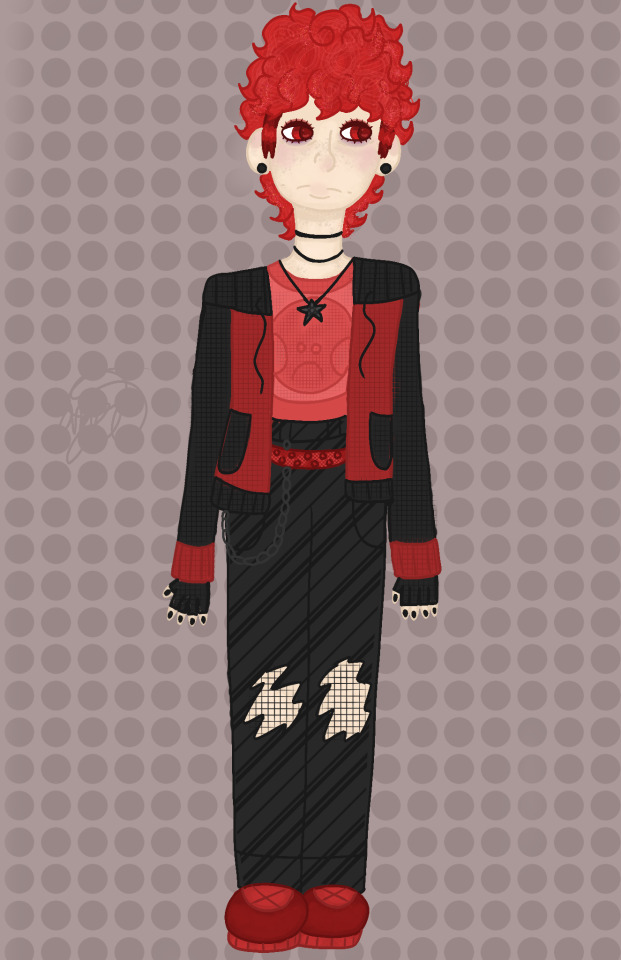
Name: Johnathan Carter.
Special Titles: Vice President.
Nicknames: John, Johnny McChairboy.
Age: 48.
Pronouns: He/Him.
Sexuality: Gay.
Gender: Cis Guy.
Species: Human.
Disorders: PTSD, Autistic, Insomnia, Bipolar 1, BPD.
Active Addictions: Nicotine (Cigarettes.)
Recovering Addictions: Self Harm.
Religion: None.
Job: Vice President of New America.
Degrees: Has a A.I Engineering Degree.
Lives in: WV, New America, 3025.
Languages: French, English.
Height: 5’7”
Race: White.
Ethnicity: French.
Accent: Rural French.
Vehicle: Red Electric Car.
Weapons: Pistols.
Alignment: Chaotic Good.
Text Color: Red, All Caps.
Main Animal: Red Panda.
Main Hobbies: Video Games, Wood Carving, Computer Programming.
Favorite Drinks: Black Coffee, Strawberry Lemonade.
Favorite Meal: Pepperoni Pizza, Subway Sandwiches, Red Beans and Rice, Chicken Marengo, Mac and Cheese.
Favorite Dessert: Icecream Sundae, Red Velvet Cake, White Chocolate, Pound Cake.
Favorite Flower: Roses.
Scent: Old Spice Timber.
Birthday: January 9th 2977 (Capricorn.)
Awareness: Not Aware (Effect: None.)
Theme:
Playlist:
Fun Facts: He actually DOES speak in all caps.
Special Interests: Virtual Reality Games
Stims: Lots of physical stims, Stress Toys, Tangles.
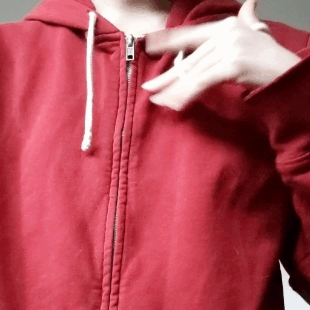


Stimboard: LINK
Moodboard: LINK
Fashionboard: LINK
Family:
Bradley Carter, Joanna Carter. (Parents)
Alexander Leverett (Adoptive Son)
Johnathan Jr. Carter (Son.)
Friends: Nova Star.
Romance: N/A.
Brief Personality: John is incredibly loud, it seems that he is always yelling, not in an angry way, he simply just has no volume control. He is incredibly passionate about things and genuinely cares a lot about his sons. He would die for you if you manage to get past his rough exterior. But he also has no time for anyone’s bullshit really.
Brief Backstory:
Johnathan had a very boring childhood. His parents left him to his own devices, which led him to have a very.. intense personality growing up. He’s always been very loud, wanting to be the center of attention always.
When he grew up, He began to dive headfirst into A.I, getting a degree in A.I engineering and eventually head starting the next generation of A.I, he wanted to be the very best in everything he did, perfect grades, perfect career, perfect inventions, perfect wife, perfect kid. And eventually this caught the attention of The President of New America.
She and Johnathan became… friends..? He wasn’t exactly sure what Maria’s true opinion was on him. But she loved his inventions. And eventually when The Incident happened she gave him leadership of “The Authority”, an organization solely created to stop the rise of A.I..
Johnathan did his job well, until he had to stop Alexander.. He genuinely did try to see Alex as nothing but a robot, but Alex was just a child, and he reminded him of his child. And eventually Johnathan was able to break free of Maria’s grasp and help Alex save the world.
He sometimes wishes he could have done his life differently. So that his sons could have a better life.
#Spotify#Johnathan Carter#John#Johnathan#oc#ocs#oc reference#original character#the trolley problem#original character reference
0 notes
Text
MALMAISON MEDIA SALON SOIRÉE 10: BITTER GLORY (2015)
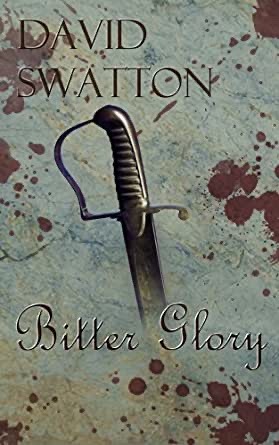
1. The Introduction
Greetings, dear Neighbors. Welcome to the tenth soirée at the Malmaison Media Salon.
Now that I say it, it looks like we have an anniversary, so I hope we can have fun and celebrate the occasion... And do some historical analysis of Napoleonic fiction while we’re at it because why the fuck not?!
Anyway, today’s review subject is Bitter Glory by David Swatton and it was published in 2015, so that’s recent.
I don’t remember how exactly I stumbled upon this book for the first time but the summary promising an exciting adventure involving a conspiracy and the fact that it’s set during the Second Italian Campaign did get me hooked because... reasons.
But let me tell you, digging the bloody thing up was a fucking nightmare and, unfortunately, it’s not readily available online.
Moreover, the ebook version was only on the British and the Indian versions of Amazon but I still managed to get it on the website of Fnac (a chain of stores that sell books, gadgets, DVDs and other stuff) for 3,17 euros. So I guess for most people it will be either Amazon or Fnac to the rescue.
Anyway, was it worth the amount of money I could’ve spent on a cup of herbal tea and a slice of cake instead? Good question.
This review is dedicated to @maggiec70 (who also read the book and promised to say quite a bit about it in my review) and @josefavomjaaga .
2. The Summary
I already copied and pasted the summary in my announcement post but here it is just in case someone didn’t see that post:
“In 1800 Napoleon Bonaparte’s grip on the reins of power in Revolutionary France is far from secure. The French Army has seen serious reverses in the last three years and stands on the brink of another defeat with thousands of men besieged and starving in the city of Genoa. He needs a great victory to secure both his military and political position and he is looking to northern Italy to gain that victory. Like Hannibal two thousand years earlier he will cross the Alps with an army to fall upon his enemy. Caught up in this grand strategy is a young cavalry officer, Antoine Chauvelle, returning to his regiment from leave as they march to war. From the struggle over the mountains to the desperate fight for survival in a besieged and pestilential city, events sweep Chauvelle into a mad vendetta with a notorious duellist and a plot that could undermine the campaign and will culminate on the bloody battlefield of Marengo.”
At first glance (in my opinion) the premise sounds pretty cool and gives me the vibes of what could be a good adventure story, kind of like the swashbuckling novels I grew up reading.
Unfortunately, I found out the hard way that looks can be deceiving... Let’s unpack this one, shall we?
3. The Story
Like I said, I like the premise with a vendetta and a conspiracy. On paper, the plot could’ve been really good, which makes the fact that it isn’t oh so painful.
First of all, the novel likes to takes its sweet ass time and the introduction part (the one where we get to know the setting, the characters, etc) moves along with the speed of a pregnant snail which almost made me twist my jaw from yawning.
Don’t get me wrong, introduction is crucial and all, but I don’t need several fucking chapters spent on it! Move faster please!
By the way, the scenes of action like battles also tend to drag on for too long so I would rather watch a re-enactment than read all of that! (Shoutout to @michel-feuilly and @pobodleru who participate in re-enactments!)
Oh, and I also hate the fact that a major plot line (the one with the vendetta) gets an extremely anticlimactic resolution. For context: Chauvelle and this duelist guy are about to have their climactic duel, only for Lannes to break up the fight and tell them off because he needs both men for an upcoming battle. And that’s it!
No, really, that’s how the conflict ends, which is a bit disappointing to say the least, as I was hoping the two would still get an opportunity to fight later. Oh well...
I do like the scenes where Chauvelle (who is joined by Delombre, his close friend) investigates the conspiracy while staying in the besieged Genoa (Chauvelle was sent to Genoa to deliver a message to Masséna and it’s not the only time he does the delivery thing) but, like the introduction, those scenes end up being a bit too long at times and the bulky writing style doesn’t exactly help.
I did like the way the prologue was written at first, but I feel like it wasn’t that necessary as, ultimately, it doesn’t play into the main story as much as I hoped it would so I guess the book wouldn’t suffer if the prologue got removed completely.
That being said, I like several things: There’s no love triangle and the major female character isn’t a love interest. Sometimes the descriptions of battles are pretty good and the book doesn’t shy away from showing atrocities, blood, injuries and gore.
Also worth noting is the fact that a secondary character gets killed off and his death is final, which is something I appreciate in this context.
Unfortunately, the pacing here is the main buzzkill and there’s a bit of Thermidorian propaganda that implies Robespierre was a dictator who orchestrated the Terror. Which... not true.
4. The Characters
Antoine Chauvelle himself isn’t really my favorite. He has flaws, I’ll give him that, but I still find him a bit bland as a protagonist. I don’t know why, but I just cared about him less than I thought I would. I also kind of didn’t like that, after proving himself in one battle, he is quickly promoted to one of Lannes’s aides and entrusted with delivering a ton of valuable information... I think I would like Chauvelle to prove himself more before that. But he does get injured during the story so props for realism.
His sidekick in the story, Joseph Sarrut, is a different story. I like their “scoundrel and gentleman” dynamic and their interactions are heartwarming, like a buddy cop movie where the cops are already friends. Sarrut had a hard life, but he is not a bad person at all and is loyal to Chauvelle. I like that. Oh, and this is one of the few heroes with scars that I have seen in media so far, which deserves some credit as usually villains are the ones portrayed with scars.
As for the major female character, Claudine... I like her but I think her potential is kind of wasted. Probably justified as she is a sutler (or vivandière) but it still feels unfortunate because I would like to see more of her. I like that she is confident (relatively at least), wants to be independent and is genuinely kind.
Lannes here cusses a lot, has a temper but he can be reasonable and even friendly. After Chauvelle proves himself in battle, Lannes entrusts him with a few retconning missions and also with delivering several messages (which is the way the book explains how Chauvelle gets from place to place, @josefavomjaaga ).
(Spoilers ahead!)
Masséna is definitely his usual greedy self and he has a degree of vanity to him. He is also implied to be the person in the prologue who murdered the father of one of the conspirators and that... that came a bit out of the left field, but I guess it’s reason enough for that conspirator to want to discredit Masséna, even though it’s never outright confirmed who the killer was.
Eugene de Beauharnais is never mentioned. Sorry, @josefavomjaaga .
Napoleon is one of the minor characters and he definitely has his moments of anger but is also ambitious and apparently values lucky people. I don’t know how accurate his portrayal is though.
Murat gets a cameo during the battle of Marengo but you really have to play “Where’s Waldo” with the story to find him. Fortunately, he doesn’t seem to be a bumbling dummy so that’s nice. He is also brave in his cameo appearance so yeah. You may calm down, @joachimnapoleon .
Berthier, Bessières, Suchet and Desaix get cameos too, but the death of the latter doesn’t seem to affect Napoleon at all, so... that happened.
No, I’m serious, Naps isn’t seen reacting to Desaix’s death. I get that they aren’t the focus of the story but I would appreciate at least a mention? Because here it looks like Naps doesn’t give a shit.
I do appreciate the fact that multiple characters get credit for the outcome of the Battle of Marengo, by the way. Not just Desaix, but also Lannes, Murat, Victor, Kellerman... I like it.
Oh, and there’s a cameo from Larrey in a flashback. Which... nice but the flashback itself was random as fuck.
Fouché doesn’t appear but he is behind the conspiracy and he is naturally despicable! Yay! Seems to fit. Also the way he massacred people in Lyon isn’t glossed over.
5. The Setting
The style kind of didn’t let me fully enjoy them, but I think the settings aren’t bad, especially when it comes to the besieged city of Genoa, plague, famine and all.
However, the descriptions get too long and this is tiring.
6. The Writing
Ooh boy... I have complaints.
First of all, there are severe issues with editing. I know I have them too at times and I’m working on it, but you’d think an officially published book wouldn’t suffer from such problems. Nope, it definitely does!
For example, there’s a sentence “he severely” and I assume that the author skipped the word “said” in between because it’s in dialogue. What is this, a “fill in the gaps” exercise from English class?!
Second, there are no footnotes to explain what words in italics mean. How the fuck am I supposed to know what a voltigeur is without a footnote?! And that’s just one example of the problem. I know that readers are smart but I would rather not waste my time on googling because the author’s lazy ass didn’t bother with the explanations.
Last but not least, here’s the problem I saw in The Second Empress. The long flashbacks and descriptions completely break the immersion and get confusing as fuck.
I can write descriptions better than this and I would rather get them piece by piece in moderation than a wall of text, thank you very much. It’s like making chocolate chip cookies and dumping a whole bar of chocolate into the batter instead of using, well, chips incorporated evenly.
There are also anachronisms in the speech of the characters, like using the word “bastard” in its modern sense rather than a synonym of “illegitimate child”. And I’m not sure if f-bombs are anachronistic or not but I have the impression that they appeared a bit later?
But at least it’s from the third person’s prospective unlike Moran’s Napoleonic “masterpiece” that liked to play hot potato with first person chapters and multiple characters’ point of view.
7. The Cover
Here’s a point I don’t normally include as I don’t know jack about designing covers but good God is it fucking hard to read!
8. The Conclusion
As I said before, usually I don’t tackle historical accuracy so I can’t pass judgment on that.
However, I can say that the story drags on, waists a plot line and ultimately doesn’t deliver at all. Even I can do better and I have less experience with life, researching and writing than most authors of boring historical fiction.
Quick, someone, get me a deal so I can publish novels since it’s apparently alarmingly easy to churn out whatever the fuck I want!
(On a serious note, I definitely want to get published in the future and countering the bullshit in these bad novels is one of my reasons for writing. That, and I respect readers a bit to much to put up ridiculous shit.)
Anyway, I’d say the book isn’t worth your time and now, if you’ll excuse me, I’m going to look for good media to cleanse my palate. Hopefully you enjoyed the review and found it helpful, but I’m also curious about what @maggiec70 has to say.
Alright, on this note, let’s finishe our anniversary soirée.
Stay tuned for future updates, Neighbors, and stay safe.
Love,
- Citizen Green Pixel
#history#malmaison media salon#napoleonic literature#napoleonic art#napoleonic media#napoleon bonaparte#bitter glory 2015#literature review#dominique jean larrey#louis charles antoine desaix#joachim murat#jean lannes#andré masséna
26 notes
·
View notes
Text
Bernadotte, Joseph, and Savary: a letter
Since correspondence seems to be a recurrent topic lately, I’m posting the text of a letter I have found, from Bernadotte to his brother-in-law Joseph Bonaparte, about his friend Savary:
L'adjudant général Savary, votre ancien collègue, désire mon cher Joseph quitter le service pour entrer dans la partie forestière en qualité de conservateur. Ses goûts, ses anciennes habitudes et surtout le délabrement de sa santé le déterminent. Savary est mon ami il s'est toujours très bien conduit envers vous, c'est sous ce titre et la garantie d'une probité sévère que je lui donne cette recommandation auprès de vous. Je vous prie de l'appuyer auprès de votre frère. Je vous salue fraternellement.
Paris le 12 floréal an [??] J Bernadotte
Adjutant General Savary, your former colleague, wishes to leave the service, my dear Joseph, to enter the forestry sector as a conservator. His tastes, his former practices and above all the poor state of his health have decided him. Savary is my friend and has always behaved very properly towards you; it is on this basis and with my guarantee of his strict probity that I can give him this recommendation to you. I would ask you to recommend him to your brother. I send you my brotherly regards.
Paris, 12 Floréal year [??] J Bernadotte
https://www.invaluable.com/auction-lot/-4C34E7B83E
This letter was sold at auction, and the catalogue description gives the equivalent date as May 2, 1800. I don’t know the exact date of the battle during which Desaix was killed (Marengo?), but it would have been not too long before or after this.
Savary has served under Desaix until the latter’s death, as an aide-de-camp I believe. Desaix’s death was not as represented in paintings: he was shot and killed instantly; as I recall, his body was entirely stripped of all clothing as was usual at the time, and it was Savary, looking for him, who found him among the dead. Savary recognized Desaix from a ribbon used to tie back his hair.
As far as I know, Savary did not become a forestry conservator (who knew he had an interest in forestry?). Instead he became Napoleon’s hatchet man, and his chief of police after Fouché’s ouster.
I’m endlessly fascinated by who was whose friend - or enemy -, and how early in life such relationships were forged. Joseph and Bernadotte had married the Clary sisters and were brothers-in-law; Savary was Bernadotte’s friend, and worked alongside Joseph in some capacity..
Bernadotte has been much maligned for “betraying” Napoleon (wrongly so, in my opinion); but Marbot and Rapp both write favourably about him, and he was friends with Ney, Jourdan, and many others.
24 notes
·
View notes
Note
two questions AGAIN because i love the bonapartes..
1. What happened to the original bicorne Napoléon wore that's shown in some artwork as him as a general (like in the alps picture)?
2. Are there any more firsthand witnesses to Napoléon's appearance that are funny or interesting?
1. Napoleon had several hats during his lifetime. I think there are maybe seven or so that still exist. He had more than that of course made in his lifetime, when they wore out, they were given to the blacksmith to cut up to use for scraps. The oldest hat that still survives was one that he wore at the Battle of Marengo, and the Musee l'Armee has it in Paris. Four hats went with him to Saint Helena and he is buried with one.
2. Of course! I try to post them as I come across them. Here is one to enjoy from Prussian philosopher and linguist Wilhelm von Humboldt:
"He is small and lean, has a small head, and it seemed to me for such a figure his hands were small and delicate. His face is more oval than round and very spare. His hair is brown and thin. His forehead, as far as I could see from the hair over it, is flatter than it is prominent, and the arch of his eyebrows is strong, marked and well curved, such that his forehead protrudes above his nose. His eyes are large, deep-set and finely contoured, his nose curved, but not hooked though it is cleanly and strongly contoured. His mouth and chin are very masculine, strong, and his chin is especially strong an roundly contoured. His upper lip stands out over the lower one and the line between the corners of his mouth and his nose is rather straight, though without giving an air of harshness or pride. As he is rather lean, his cheekbones are pronounced and all of the muscles of his face move when he speaks, even his nose, and to an astonishing degree. He often makes a blinking movement that makes his lower eyelid rise...though this does not evoke grandeur, but rather makes him look much smaller. He was dressed very simply, in a blue coat and overcoat with sleeves reaching almost his fingers, and in boots and spurs. His hair was in a pigtail and powdered. His physiology has nothing large about it, or heavy, or determined, and he seems to exude more intellectual than moral qualities. He seems clam, pensive, decisive, and, although he has a strong and justified pride, he seems relaxed, perceptive and very serious, as if he is committed only to his work, without any other penchants or interests. Sometimes his expression takes on a harder and cutting edge, especially when he is moving. It would be difficult to imagine him in action, and even more difficult to imagine him enthusiastic. His face is quite modern, and in my opinion is more French than Italian. In terms of the intellectuality of his expression, he could be an example of the ideal of the modern."
His description of Josephine who he found extremely polite, pretty, and delicate....
"Nonetheless, she has a face of a woman of the world, on with a certain amount of experience. Her complexion is yellow. She must be over forty years old. She took pleasure from seeing my children and thought, when my son was speaking German, that he was English. She admired Li's (Karoline, Humboldt's daughter) blond hair, stroked her head, and, with her hand on her hip, let her head rest under her arm."
13 notes
·
View notes
Text
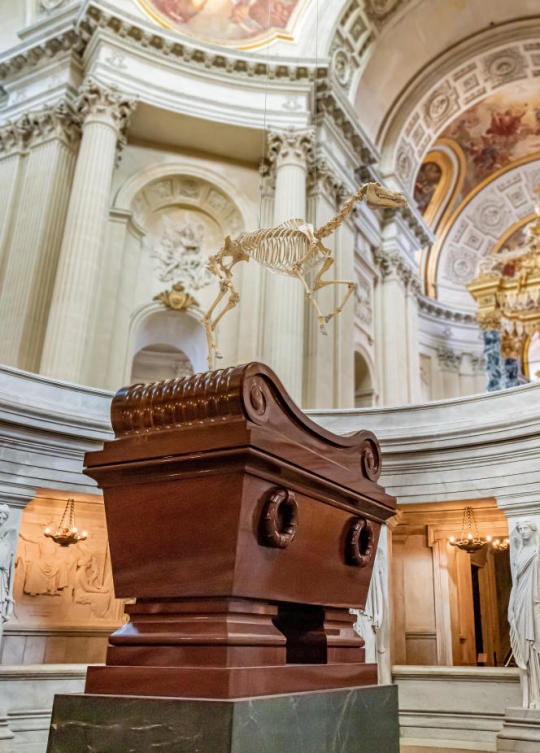
Unpopular opinion, probably, but then, I am a bad bonapartist after all. I kind of like this; the installation is called Memento Marengo and it's a work of French artist Pascal Convert. It has sparkled some controversy among French historians specialists of the Napoleonic period, to be more specific Thierry Lentz - his books are better than his Twitter account - and Pierre Branda. The installation, which is a replica in plastic of the skeleton of Marengo, Napoleon's most famous horse, is part of an exposition in which “thirty contemporary artists [including Julian Schnabel and Marina Abramovic] received carte blanche to question this symbolic and historical figure” (source). The installation will be on place from May the 7th to next January.
I won't bore you telling how there wasn't really a horse named Marengo in the imperial stables, but anyway if you want to read the author's interpretation, which is the one that counts, there you go. A fragment, translated with google because, oh surprise, I have become even lazier and I am so not looking forward to controversies around Naps' commemorations (other than I agree in commemorating the bicentenary while not forgetting all the terrible stuff? Yeah, that's where I stand):
Bringing Napoleon's horse back to the tomb of his rider accomplishes an ancient funeral ritual that wanted the combatants to be buried with their mounts, as is the case with the Gallic tomb of the Gondola riders, at the necropolis of Piovego in Padua or in some archaeological sites in China. In some cases, the horse was not buried with its rider but suspended above its grave, a sort of celestial vehicle to the afterlife. No sacrilegious attack on a national necropolis, the simple fulfillment of a destiny.
But also a questioning. The presence of a skeleton above the tomb summons the transients sculpted on the tombs, of the Saint-Denis basilica for example. Beyond the pomp and glory, death is present (...)
The Memento Marengo sculpture draws the constellation of Napoleon Bonaparte, from his rise to his fall, and recalls the fate of every human being, even when blinded by his glory, he takes himself for a demigod. It is a contemporary memento mori… Remember that you are going to die, the expression was repeated by the slave who accompanied the victorious Roman general during the ceremonies celebrating his victory. Napoleon should have remembered this before reestablishing slavery. The fate of humans brings them together in death.
The vitality of energies in France currently leaves little room for nuance. This is why the work of historians is so important and why they should have no other ambitions than to serve history. Our common history.
8 notes
·
View notes
Text
Charles de Flahaut

Auguste-Charles-Joseph de Flahaut de La Billarderie, comte de Flahaut (21 April 1785 – 1 September 1870) was a French general during the Napoleonic Wars, a statesman, and late in life French ambassador.
In the opinion of the unnamed author of a biography on Flahaut in the Encyclopaedia Britannica Eleventh Edition: "The comte de Flahaut is perhaps better remembered for his exploits in gallantry, and the elegant manners in which he had been carefully trained by his mother, than for his public services, which were not, however, so inconsiderable as they have sometimes been represented to be".

He was born in Paris, officially the son of Marshal Alexandre-Sébastien, comte de Flahaut (2nd son of Charles-César, marquis de La Billarderie) who was guillotined at Arras in February 1793, by his wife, Adélaïde Filleul .However, Charles de Flahaut was generally recognized to be the offspring of his mother's liaison with Talleyrand, with whom he was closely connected throughout his life.
Charles de Flahaut volunteered for military service joining the cavalry in 1800, writing to Général Bonaparte:
“General, I am only sixteen, but I am strong. I can speak three languages rather well [..] Too young to be a soldier, I dare ask of you to be your aide-de-camp. Be assured I will be killed or will have vindicated your choice by the end of the campaign.”
With Talleyrand’s help, he began a fast and impressive military career.
He served under Louis Bonaparte, then Murat and Berthier (and then was the Emperor’s aide-de-camp in 1813). He fought in Marengo, Ulm, Austerlitz, Iéna, Eylau, Friedland, Wagram, the campaign of Russia, Dresden, Waterloo.
First dismissed by Napoleon as a pretty boy (”He sings well ? Wonderful quality for a soldier [...] Ah, a pretty boy, that’s all that matters to you, women [..]” - to Joséphine), he was finally acknowledged by him as “a man fit for anything.”
After Waterloo, he tried to defend the King of Rome as Napoléon II. His military career was over - Talleyrand’s intervention protected him from exile, although he chose to get away from power for a while.
He was known for his many affairs (Pauline, Caroline, the polish princess Anna Potocka, and especially Hortense de Beauharnais) and married in 1817 Margaret Mercer Elphinstone, daughter of the admiral Lord Keith with whom he had five daughters. Among his descendants was the French politician Michel Poniatowski (related to Marshal Poniatowski).
With Hortense, he had a son, Charles de Morny, (later known as Auguste de Morny), born in 1811, who had a good relationship with his father’s legitimate family, and helped his half-brother Louis-Napoléon Bonaparte to stage his coup d’Etat.

Attached to the Empire, Flahaut was soon disappointed by Napoléon III and stepped away from politics, though he kept some honorific titles. He ended his life as a diplomat, between Paris and London, and died the day the Second Empire fell.
30 notes
·
View notes
Text
OPINION.
Y’all think that this is NYC/ CT JK hairstyle or post BUSAN hairstyle??
Where ma experts at??👀👀👀…
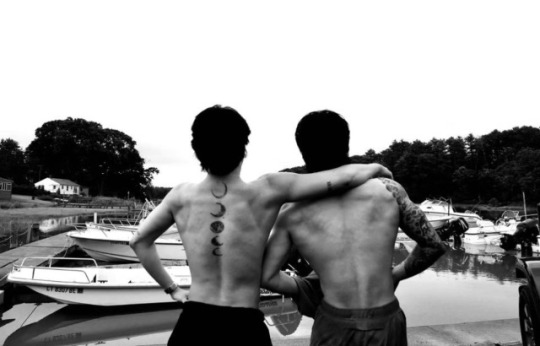
In the meantime, I’ll be making my way to my body from hell, give me a couple of hours …
Marengo.
34 notes
·
View notes
Text
I feel Grantaire sometimes stumbles into actual good points on accident
“So much for myself; as for the rest of you, you are worth no more than I am. I scoff at your perfections, excellencies, and qualities. Every good quality tends towards a defect; economy borders on avarice, the generous man is next door to the prodigal, the brave man rubs elbows with the braggart; he who says very pious says a trifle bigoted; there are just as many vices in virtue as there are holes in Diogenes' cloak. Whom do you admire, the slain or the slayer, Caesar or Brutus? Generally men are in favor of the slayer. Long live Brutus, he has slain! There lies the virtue. Virtue, granted, but madness also.
[...]
One century is the plagiarist of the other. The battle of Marengo copies the battle of Pydna; the Tolbiac of Clovis and the Austerlitz of Napoleon are as like each other as two drops of water. I don't attach much importance to victory. Nothing is so stupid as to conquer; true glory lies in convincing. But try to prove something! If you are content with success, what mediocrity, and with conquering, what wretchedness!
[...]
Do you wish me to begin admiring the peoples? What people, if you please? Shall it be Greece? The Athenians, those Parisians of days gone by, slew Phocion, as we might say Coligny, and fawned upon tyrants to such an extent that Anacephorus said of Pisistratus: "His urine attracts the bees." [...] Let us pass on to others. Shall I admire England? Shall I admire France? France? Why? Because of Paris? I have just told you my opinion of Athens. England? Why? Because of London? I hate Carthage. And then, London, the metropolis of luxury, is the headquarters of wretchedness. There are a hundred deaths a year of hunger in the parish of Charing-Cross alone. Such is Albion. I add, as the climax, that I have seen an Englishwoman dancing in a wreath of roses and blue spectacles. A fig then for England! If I do not admire John Bull, shall I admire Brother Jonathan? I have but little taste for that slave-holding brother. Take away Time is money, what remains of England? Take away Cotton is king, what remains of America?”
Honestly, I feel like it’s less that he doesn’t have an understanding of the ways things are wrong with the world, it’s more that he refuses to draw the necessarily conclusions from that understanding. The world is bad and he refuses to believe it can be made better - not helped by his seemingly severe depression. IMO he hangs around Les Amis because he would like to be able to believe, but ultimately, it is only in those last moments when he chooses to die alongside Enjolras that he’s able to take that step - and even that is something he does for friendship at least as much as for belief.
Yes, I am obsessed with his The Back Room of the Café Musain rant no I will not shut up
#there are many modern grantaires in this world#he reminds me of some disillusioned socialists i know#in that he like... Gets It but he also refuses to take the extra step#and often refuses to take things seriously because in doing so you would have to face your beliefs#and who wants to do that#grantaire#les mis#siggi rambles#my meta
217 notes
·
View notes
Note
I love your Garcy/Timeless fics! Should you feel so inclined I have a prompt: Garcy + polyglot (one of my favorite things about Flynn, ahem).
Thank you! I loved your prompt! It took me a while because it got long. There is hurt/comfort and gratuitous historical atmosphere and these two are very solicitous of each other.
To the Time Team’s genuine surprise, and Rufus’ feigned indignation, Flynn’s languages turn out to be his most consistently valuable asset. (The missions requiring a singleminded and virtuosic violence have become more rare since Emma’s takeover of Rittenhouse.) To Lucy, who swotted dutifully for her Ph.D. reading exams, the most remarkable thing is the ease with which he seems to navigate them. She had, of course, realized at some level that he spoke the kind of Spanish that could get him an audience with Santa Ana, the kind of German that allowed him to navigate Nazi Germany with the language as the least of his worries. But she still finds it impressive to watch him work; she still finds it almost mesmerizing to listen.
***
Italian (New York City, 1928)
“This looks like the set of ‘The Godfather,’” says Rufus, eyeing the game of bocce in the public park across the street.
“I think this was the set of ‘The Godfather,’” returns Wyatt, squinting up at the awning of the DiLuca funeral parlor.
“This is not the time,” hisses Lucy. “Fiorello La Guardia is anti-racist and anti-corruption, and if Rittenhouse arranges a fatal accident, all his mayoral policies are finished before they’ve begun. The ma — er, the families — are the least of our worries. They keep order in these streets because no one else will. And we need to find La Guardia now.”
“Right,” says Wyatt. “The out-of-work-laborers bit. I’ll ask at the bakeries, Rufus’ll take the vegetable-sellers. We’ll keep our ears open. It’ll be all right, Luce.”
She is far from sure, but she manages a smile. These are her people, and she trusts them, and that has to be enough. As Rufus and Wyatt turn aside on 188th St., she and Flynn stay together. Since Chinatown, Agent Christopher’s official policy has been to treat Lucy as a potential target. So Lucy has grown used to Flynn’s hand at her elbow, his presence like a bulwark. (In a frigid eighteenth-century winter somewhere near the Canadian border, she had tried to suggest to the team that what Agent Christopher didn’t know wouldn’t hurt her. Wyatt had simply said “No,” just as Rufus threatened to tell on her. Flynn had said nothing at all; Lucy cannot forget the look on his face.)
What takes her by surprise in history, over and over again, is how much she loves it. The thrill and the terror of being on hand at pivotal moments in time… even those she has become halfway accustomed to. But places like this neighborhood — the warm sunlight on the bricks of the Catholic church to their left, the Sicilian pizza-seller with a face like a walnut, the seamstress on her stoop, the graceful scrollwork on the fire escapes of ordinary apartment buildings — these leave her with a lump in her throat and an ache under her ribs.
A lean man in a smock is setting out dried codfish at the corner grocer’s, where a Star of David is set into the tiled threshold. He watches them with curious eyes; Flynn greets him with a tilt of the head and a courteous Buongiorno, establishing their bonafides. They walk as far as the market. Lucy admires the artichokes, assesses the access routes, and reproaches herself for not expecting a language barrier in the Bronx. Two brothers argue amiably over their vegetable stand, a young couple flirts by the butcher’s, and nowhere does Lucy see anything suspicious.
Flynn presses a bunch of flowers into her hand, and she blinks up at him. The florist thanks Flynn — that much she can make out — and she does not think it is only for his purchase. The man’s son, a boy of about eight, follows them with dark eyes as they walk away.
“I told him,” murmurs Flynn, when they are out of earshot, “to send his son home. Let’s find the others.”
Lucy has to stop herself from glancing over her shoulder. “But I didn’t see anything!” She may not have the language, but she is a historian, and all the evidence is here. “No one — no one avoided anyone else, no one lingered too long at the delicatessen…”
“And with the woman selling dried goods no one lingered at all.”
“That could be because she’s a Protestant or because she’s taken the wrong lover or…”
“She was greeted respectfully and perfunctorily,” cuts in Flynn quietly, “and there was a gun in her mending bag.”
Lucy takes a deep breath, inhaling the scent of her yellow roses. She can’t help the familiar, twisting guilt that settles in her gut; she can’t help feeling that she ought to apologize for lashing out in anger against her own powerlessness. But with him, she thinks, she doesn’t need to. He knows that anger well enough.
***
French (Marengo, 1800)
Lucy’s French is passable. She knows this, and she also knows it to be just passable, passable with the right backstory or the right degree of incuriousness on the part of whoever is speaking to her at the time. Fortunately, with Napoleon’s forces sweeping down over the Alps and through the Piedmont, odd regional accents are ten-a-penny. The diction of the friendly locals offering information about the Roman forces is likely to be the least of the sentries’ concerns. So Lucy does the persuading, alight with the conviction that Melas must be defeated, earnest in explaining why it is vital that she and her husband speak to the Consul himself. (She had never thought she’d be grateful for the necessity to pander to the military history nuts in her survey courses; but oh, she is now.) Though the guard cocks an eyebrow at her halting attempts to describe topography, he calls over his superior officer — and they’re in.
“Essaie de ne pas paraître trop soulagée,” murmurs Flynn, and she straightens her shoulders, walks taller at his side.
The most astonishing thing about the camp of the French army is its size: the reality of cooking fires and canvas tents, latrines and laundresses, on the scale necessary to accommodate this many soldiers. There is more mud than Lucy had expected. There are more knots of men just sitting around, polishing bayonets or playing cards. There is far more singing, and Lucy itches to get her hands on pencil and paper, to transcribe the bawdy invented verses and the wistful folksongs, ephemeral and vibrant and achingly human.
“Let’s drink to Fanchon! I marched out to seek for glory, and I found it in her arms! Drink to Fanchon…”
“How sad the girls of Paris must be, pining for their soldiers…”
“Will a Gascon ever forget what he owes you?”
“The saints of France are a noble lot, but they ain’t got what our Bonaparte’s got…”
Together they wait. The June night is warm, and the army is at ease with itself, but Lucy can feel her heart racing. The Austrian army is waiting for the First Consul of France. The European Coalition is waiting to see what happens. And she is waiting for an audience with Napoleon. An aide approaches them.
“Je vous saurais gré de me suivre.”
It turns out that Napoleon Bonaparte — republican hero and future emperor, upstart Corsican and French hero, social reformer and ruthless conqueror — is not, in fact, shorter than Lucy. In a purely technical sense, she discovers, she can look him in the eye. But this is an academic point; he is an overwhelming personality. Lucy’s mouth goes dry. She can still smell the tomatoes and garlic from the first consul’s dinner (not yet poulet Marengo, but soon.)
Watching Flynn cover the ground with febrile steps, watching him supply information to one of the modern world’s most gifted commanders, it comes to Lucy suddenly that she loves this man. She loves this haggard, earnest, patient man, who has been so much more than a soldier, and who has had so little chance to be anything else.
Napoleon — Napoleon! — rearranges the maps on his desk. He demands that Flynn show him something; this much French Lucy understands without difficulty. And with steady hands, fluent gestures, Flynn does.
It won’t be the victory they know, whatever happens. They will return to the present not with Napoleon snatching victory from the astonished Melas after being taken by surprise himself, but with an outcome hopefully similar. Lucy’s head aches when she tries to think about the possible ramifications of Rittenhouse throwing their weight into the European balance of power at the dawn of the nineteenth century. But somewhere between instinct and professional opinion lies her deep conviction that she and Flynn cannot do other than they are doing. In the oily light of cheap candles, Lucy watches Napoleon Bonaparte’s face, grave in attention like that of any scholar listening to a fellow-specialist. She cannot help but feel that the strange, pyrotechnic attempts of this man to craft a new kind of empire must be preferable to an Austrian stranglehold on power, or to bloody in-fighting among the powers of Europe.
“…comment?” says the consul, and Lucy shakes herself slightly. The tension in the air warns her that it was a question unlike those that came before.
“Il y a quelques ans,” replies Flynn, “j’ai fait la connaissance d’un de leurs capitaines. Nous avons lutté farouchement contre les mêmes ennemis, selon ce que je croyais. Il m’a trahi. Il a tué l’un de mes amis. Je connais à présent ce qu'il est capable de faire. Contre un tel adversaire, nous mettons notre confiance en Votre Excellence.”
Lucy could swear that Napoleon’s mouth twitches briefly — in faint amusement at such formality from a man who had been communicating in professional jargon moments before, or in human sympathy, she cannot be sure. He nods briefly. “Je vous suis bien reconnaissant.”
It is their dismissal. Lucy suppresses the desire to pull Flynn out of the tent, away from the possibility of interrogation, towards the anonymous June darkness where she can kiss unfamiliar syllables from his lips.
***
Only at night do his languages become confused. Lucy’s body remembers the timeline when her mother was an invalid, and she wakes easily. So it is not a hard thing, to get a hand on his chest — his heartbeat racing under her palm — and call him to her out of dreams. Sometimes he rouses with a start; sometimes he wakes still muttering, until he sees her, and his vision clears. He covers her hand with his, and silence is all they need.
After Cologne in 1941, he speaks less during the day, and at night not at all. Lucy used her choir-and-exam German to charm an administrator, and Wyatt used his military German to converse with the guards, and between them, they had been able to get the plans that Rittenhouse had tried to place in the hands of the Nazis. And Flynn used his German to get himself apprehended, and then to say nothing at all. The team had reasoned that dealing with one threat would make the Gestapo less suspicious of another; the event had vindicated them, and Wyatt had gotten them out. But Lucy lies awake at night, listening to the breathing of a man who no longer talks in his sleep.
She does not always wake him. And she knows they cannot fight each other’s battles (she tells herself that the knowledge should not feel like a defeat.) But she does sometimes: if he breathes as though he had been running; or if he makes a noise choked off before it can become a keening. When he wakes, he never says anything but her name.
“Lucy?” Sometimes he says it as though it is a reality he cannot quite believe in.
“Lucy.” Sometimes he breathes it as though it is the only word he can remember, his shibboleth and his claim to sanctuary.
“Yes.” Sometimes she thinks that her heart will break with loving him. “Ich bin’s, it’s me, I’m here, je suis là, ja sam tu.” She whispers reassurance in all the languages she knows, and with the silence of her mouth against his.
92 notes
·
View notes
Text
Les Miserables 2018 Reactions
Episode One
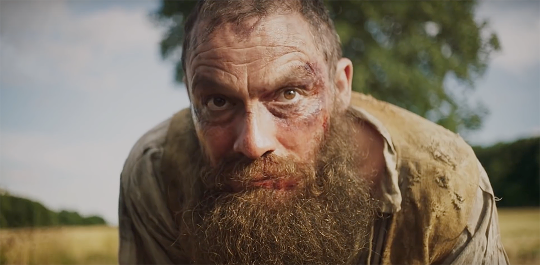
A title card gives a brief summary of the situation in France before dropping us into the day after the Battle of Waterloo, when the “glory” of battle is over and the gore remains.
Rather fitting for a series translated to The Miserable (or Wretched) Ones.
Yikes. British viewers really weren’t kidding about the typeface. Or that 1970s slasher movie red.
But in all honesty, I like the change in opening. It’s a bold move, sure, but it grounds viewers in a specific time in history (so only the inattentive can make the “it takes place during the French Revolution” mistake) and functions as a mirror of the eventual end.
**Book spoilers**
A Ponmercy possibly dead at the scene of a failed conflict?
A man surviving conflict and returning home to be separated from his child by Gillenormand?
Does this not sound like a bitter cycle when we know this story ends in Marius surviving a failed conflict and Valjean surviving conflict and returning home to be separated from his child by Gillenormand(‘s grandson)?
And to top it all off, the title card ends with: “The old order will be restored. The revolution forgotten.” Aside from Les Miserables, how often do you hear of the June Rebellion?
The Opening
Rain, mud, dead horses, trees shattered by cannonballs...the cinematography feels Romantic (capital R) already. A horse flutters its eyes (Is this a reference to Napoleon’s war horse Marengo, famously depicted in Napoleon Crossing the Alps by Jacques-Louis David?)
Thenardier (!) rushes onto the screen, injecting it with a surge of adrenaline. Laughing (?), he hops from one dead soldier to the next, picking pockets and collecting anything of value he can get his hands on relatively quickly. And he’s not alone. There are other looters, and there are British soldiers chasing them in the background.
(Are we supposed to see a parallel between this and the way society is shown to treat its ‘dead’ and ‘dying’? Or are the British soldiers chasing people breaking laws, or at least morals, representative of how the Law works in the series?)
...But I can do without Thenardier cackling the entire time.
Anyway, he starts to loot one soldier crushed under a fallen horse when the soldier regains consciousness and, thinking Thenardier pulled him out for charitable reasons, thanks him for saving his life. Could it be Baron Pontmercy?
The Pontmercy Plot
In a rare adaptation appearance, a living Baron Pontmercy returns home alive. The streets of Paris initially seem colorful and thriving, but lintering shots of homeless beggars. Pontmercy’s father-in-law, Gillenormand, rejects him for siding with Napoleon. He goes into the “I’m glad my daughter is dead” trope, then ends it with a biting “I thank God I may never see you again.”
“It’s your lot they’re strining up from lamposts now,” Gillenormand says as we are shown a precious toddler overhearing everything. This is Pontmercy’s son, Marius, a little baby boy who will be raised to hate his own father by his grandfather.
Nicolette sneaks out of Gillenormand’s house to tell Pontermcy where he can see Marius at church.
The Fantine Plot - Part 1
A few feet away, a young Fantine is trying to convince her friends that she’s not naive and that she can take care of herself (I’ll wait for a Cosette callback in later episodes). I like seeing Fantine as a carefree young woman instead of being introduced to Fantine after she had and separated from Cosette. It makes her slow descent even worse when we see how youngshe is.
Also, we were just introduced to one man who is denied custody of his son by a gatekeeper of society, and now here is a woman who will eventually have to give up custody of her daughter by the circumstances of her society. Nice parallel!
The Valjean Plot
The yellow filter and the music makes this feel like a Western. This town ain’t big enough for the both of us, 24601...
Valjean sees one of the guards beating a prisoner and causes an avalanche that pins down the guard (so he visually echoes Pontmercy under the horse in the opening scene). Why does Valjean attempt murder? Well, this adaptation’s Valjean senses the injustice and wants to balance out this unjust society through violence (again, foreshadowing).
But when he hears the pinned man’s agony, he realizes he isn’t that person. He isn’t capable of committing a crime like that without guilt. So out empathy and guilt, he goes to lift the weight. A man lifting a weight from a man pinned under debris? Hmm...forshadowing. A man lifting a weight off someone pinned under the rocks (of society?) Hmm...symbolic.
Javert, who has been watching the entire thing, stares down at Valjean. That night, Valjean is brought to Javert’s office. Javert asks, “What was that about today?” Valjean looks at him like Because I’m a decent human being? That’s why...
Javert’s backstory is really, uh, shoe-horned in there, isn’t it? Could have revealed it later when he unwittingly befriends Madeleine or something...No?
Javert says, “Men like us have only two choices: to prey on society or to guard it.” And, well, you could view every male character we’ve met so far through that lens: Pontmercy vs. Thenardier and Gillenormand, Valjean vs. Javert.
But who’s really the one preying on people here?
The Fantine Plot - Part 2
Speaking of prey, Fantine’s out on the town with her friends. She meets eyes with Felix, and her friend Favourite urges her to be more forward with the attraction. Felix wastes no time playing the charming dance partner. The slow music switches to something more lively (and tell me if you don’t have the tiniest reminder of that below-decks dance in Titanicin this moment).
Ugh. These Fantine night scenes look gorgeous. Like a (modern) outdoor wedding.
“You have to remember they’re not serious...they’re amusing themselves.” The harsh voice of experience doles out some foreshadowing. “Why should it always be like that?” Fantine asks. The voice of change we hear throughout this series, too.
The Fantine section is also filmed like Davies’ more famous adaptations (lulling unwitting audiences into a false sense of security about where this is going...)
So many period drama romance tropes. It really does feel completely different from any other adaptation I’ve seen in this section. I like it.
Felix tries every trick in the book: I didn’t care about anyone before you. I’m going to be a poet, and you’ll be my use. Have mercy on me, I’m suffering with love for you. But Fantine has never read the playbook, and she kisses him, despite her doubts.
The Pontmercy Plot - Part 2
In case you weren’t against this prison system before, the prisoners are forced to watch an execution in a brief scene that cuts to Gillenormand saying, “order restored. Now everyone knows their place again.”
Gillenormand convinces his grandson into believe his dad’s a “scoundrel” for his political stance. Throughout the scene, little Marius is playing with army figurines, too. Hmm…can you hear commentary about how wrong this situation is yet? (The book isn’t subtle about this is, either)
Baron Pontmercy is reduced to waiting for a glimpse of his son at church. It hurts in the book, and it hurts here, too. Oh, and the religious theme comes in. (And a nice Mabeuf cameo).
This is a good time for an unpopular opinion: I’m fine with the cuts between the Pontmercy, Fantine, and Valjean stories. It makes the later inclusion of more characters and the eventual intertwining of some of these plots feel natural. It also shows how different people in this society suffer completely different unfair circumstances that bloom from this society and culture.
The Valjean Plot - Part 3
Is this what Daves meant by “sexing up “Les Miserables with a nude, underfed, and whipped Valjean? He’s muscular from forced labor. Not really sexy.
“You have your name back, Monsieur 24601.” Hey. This will be ironic in hindsight!
Oh, and (un)paid labor for prisoners commentary, too. Valjean’s furious. But why wouldn’t he be? Nearly two decades for petty theft. And in those conditions.
Valjean carries those barrels like he’s carrying the world. (Do you see the Jesus symbolism yet?)
But if he carried any hope that life outside of prison would be any more rewarding, he is quickly corrected. More manual labor with little pay. Chased away from a place to stay by dogs. Pointed to the church by a kind woman. (All in all, pretty book accurate—down to the ensuing conversation)
Cut from one faceless shot of Valjean to the Bishop, connecting the two.
Bishop with spectacles. Awww.
Valjean has the bluntness that comes across in the translations of the brick (I’ve never read it in French. Is he blunt there, too?)
The comparison Valjean draws between the religious authority figures in prison versus the Bishop here is a nice book reference, and it shows that he is very much aware of his terrible situation and how imbalanced society is (in and out of prison) versus the (actual) Christian values shown by the Bishop
“How can I love my fellow man when he treats me like a dog?”
“Even if the world has done you a great injustice. Does it really serve you to have a heart full of bitterness and hatred?”
Ooh. The quandry at the heart of this adaptation’s Valjean.
So what if it’s on the nose? It’s for viewers introduced to the book for the first time. Books are a well. Shows are a pool. It’s the detriment of adaptation.
“What about the silverware?” The bishop, knowing full well it must have been taken by Valjean, “I can’t help you, I’m afraid.”
In the few minutes he’s part of this episode, the Bishop is The Perfect Christian example that Valjean (and even other characters) will follow in various ways
The vulnerability and disbelief in Valjean’s eyes when he realizes somebody’s helpinghim and even covering for him...
Valjean’s little chuckle when he realizes he’s free again
Valjean’s what am I supposed to do with these?look at the candlesticks. Heh
“Jean Valjean, you do not belong to evil anymore. You belong to good. I have bought your soul with this silver and these candlesticks.” Again in this adaptation, there’s this sense that Valjean didn’t choose to better himself, but it was foisted onto him (the Holy Spirit foisted on him) until he eventually makes the choice to let it in himself
The episode began with Thenardier stealing and showing no signs of remorse. It ends with Valjean stealing and being presented with the means to turn his life around. Nice bookends—is what I would say if the episode ended here. But there’s more!
The Fantine Plot - Part 3
Oh, the “sexing up” was with Fantine and Felix. Just some family-friendly snuggles as he drops hints he’s going to leave her and her baby.
Fantine has a caged bird in her room. Symbolism.
Felix, Fantine, and their friends are out on a double (well, tripple) date. The guys tease a “surprise” for the women. What could it be? A beautiful day outside. A meal at a fancy restaraunt. Could they plan on...proposing?
Nope! This is a last hurrah before the guys leave to return to their “respectable” families.
I’m surprised we got an abbreviated Felix speech from the book. Didn’t expect that. And it’s all the more irritating for his character when you know what comes next: the men quietly leave the room as their girlfriends wait excitedly for the “surprise.” But the light drains from the eyes of all three of the women as they read the “surprise,” a letter stating that their boyfriends (and financial support) are leaving them forever.
The Ending
Meanwhile, Valjean leaves the village, angry at the Bishop for “buying” his soul. Conflicted, he rests beneath a tree. Then a little voice grows louder. Is it--? Yes, it’s Petit-Gervais playing with a sou and singing down the road. Valjean steps on the coin (almost intentionally) and scares Petit-Gervais away.
This is different from the book. In the book, he goes into a trance during this moment and only realizes he’s standing on the coin later (which conveniently absolves him of guilt in the reader’s eyes). Here, Valjean is brought back to the reality of his actions by the tolling of the church bell. He stole from a little boy like the prison system stole from him. A few scenes ago, he was that little boy. And he tries to do the right thing and return the coin. Like in the book, he calls for the boy to come back, but the child is gone, and Valjean is a thief again.
Meanwhile, Fantine returns home to her happy baby. She moves to curl up on the bed and cry, but the needs of her daughter Cosette draws her back to the world. Felix is no father, but Fantine is still a mother.
Valjean is free, but Fantine is about to enter a different kind of prison.
Overall, I liked this episode. There were a few changes I would have made, like concealing Javert’s backstory until episode 2 (or even later) to build up a sense of mystery to him. Thenardier was too…jovial to me, also. Finally, that scene of the women gossiping in the woods was unnecessarily choreographed, and I’m surprised PBS actually aired that scene.
When I first heard about some of the adaptational changes, I was wary of this series, but now that I see them in context, they aren’t too bad. I think an angry Valjean could make for a more dramatic transformation in later episodes. I loved Derek Jacobi as the Bishop and Lily Collins as Fantine.
But my favorite choice of this miniseries was the way it made the Valjean plot, the Fantine plot, and the Pontmercy plot run concurrently to highlight the similarities in their situations.
In the book, Hugo describes Valjean’s situation in one “book,” then switches to Fantine and goes back in time a few years to explore her experiences before her plot meets Valjean’s plot. It allows for the reader to get invested in each uninterrupted arc, but what works on paper doesn’t translate well to screen. There must be change.
We’ll see what other page to screen changes were made in the upcoming episodes. Les Miserables airs Saturday nights on PBS.
13 notes
·
View notes
Note
[Hello dear Rosie, hope you have been well. Jimin always makes you so happy and I like seeing you excited, so double the joy for me 🥰❤️🫶]
This is just in response to the “Hobi is also famous in Brazil” I’m sorry you had to go private and that this seems to have ruined your day but, and I’m saying this in the nicest way possible, whatever happened (which I don’t know as I NEVER interact on Twitter) was going to happen. Twitter has its reputation for a reason.
Does it make it right? Absolutely no. Do you have the right to express you thoughts and opinions? By all means yes. However, you. Can control reactions, and on a platform like Twitter in a fandom where solos/antis are known to be thriving, it is what it is.
You wanted to make your opinion about Hobi? You say your heart was in the right place? Then fuck’em. If I were you I wouldn’t even had gone private because you said what you said and you meant what you meant. In a way you going private is proving their point (though I’m sure you just wanted some peace and quite).
Solos and Antis will be Solos and Antis and will do what Solos and Antis do. It is time to stop letting them control our lives, particularly if you decide to put yourself out there. Hope you have a better rest of the day and I’m sure you are looking forward to Hobipalooza 💜
Marengo.
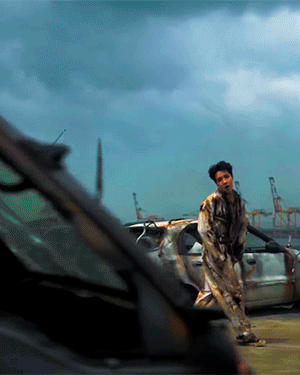
Opinions.
17 notes
·
View notes